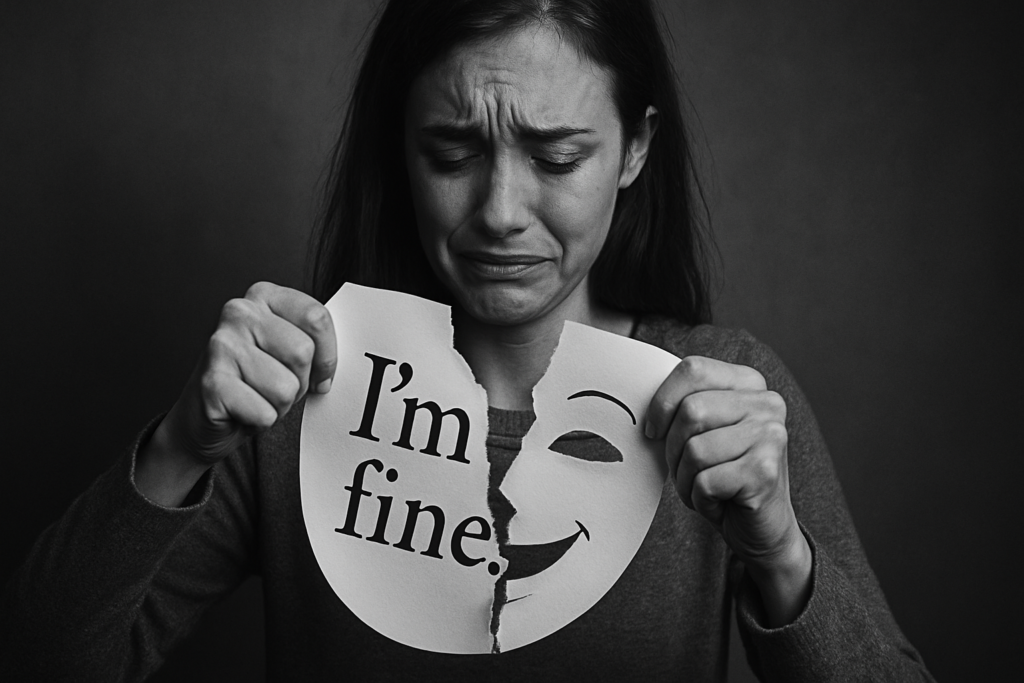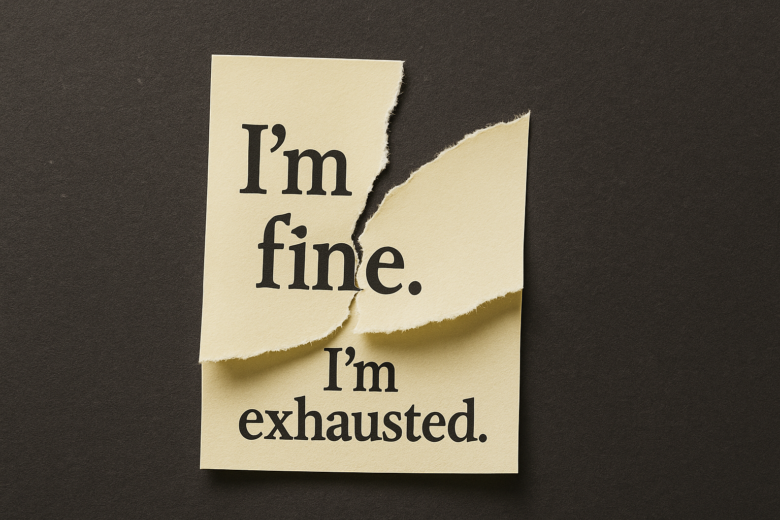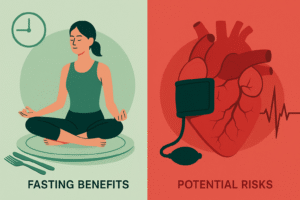Fun Fact: A 2024 study published in Affective Science found that people who habitually suppress positive emotions experience lower well-being across cultures, highlighting the universal impact of hiding true feelings.
How are you?
Most of us hear this question daily. At the store, at work, over text. And more often than not, we offer a quick, automatic reply: “I’m fine.” It’s polite, efficient—and often, a lie.
Behind that little word lies a silent epidemic. We’re hiding grief under smiles, packing anxiety into polite nods, and layering stress beneath seemingly normal conversations. We’ve become so fluent in pretending that we’ve started to forget how to be honest—even with ourselves.
This constant emotional camouflage isn’t harmless. It’s costing us—our health, our relationships, and our sense of connection.
A Culture Obsessed with Keeping It Together
From a young age, many of us are taught that emotional expression is something to control. Boys are told not to cry. Girls are told not to be “too sensitive.” Showing emotion—especially in public—is seen as dramatic, weak, or uncomfortable.
It doesn’t help that social media has set the stage for curated, filtered happiness. We scroll past highlight reels and compare them to our behind-the-scenes chaos. No wonder we hesitate to open up. Everyone else looks so together.
But the truth is, hiding your emotions doesn’t mean they go away. They build up. Quietly. Until they start to seep into other areas of life.
The Emotional Cost of Pretending
Psychologists call it emotional suppression—holding back your feelings instead of expressing them. And while it may help avoid awkward conversations in the short term, research shows it takes a real toll.
People who routinely bottle up emotions are more likely to experience:
- Elevated stress levels
- Trouble sleeping
- Difficulty concentrating
- Higher risk of anxiety and depression
A 2024 study in Frontiers in Psychology revealed that consistently hiding one’s emotions over time is strongly associated with poorer mental health and diminished self-esteem. Simply put, saying “I’m fine” too often can lead to a quiet kind of suffering.

Relationships Suffer Too
When we don’t show how we feel, others can’t respond to us authentically. Emotional suppression doesn’t just affect us—it affects the people around us.
Friends may assume you’re okay when you’re really not. Partners might feel pushed away. Colleagues can misinterpret your silence as disinterest or moodiness.
And here’s the kicker: suppressing emotions doesn’t actually reduce the intensity of those emotions. It just changes how they’re expressed. Suppressed sadness can turn into irritability. Bottled-up frustration might morph into passive-aggressive behavior.
We think we’re protecting others by hiding our pain. In reality, we’re building walls.
The Rise (and Risk) of Toxic Positivity
Another sneaky player in this game is what psychologists call toxic positivity—the idea that we should always look on the bright side, stay upbeat, and “find the silver lining” no matter what.
While optimism has its place, being forced to “stay positive” can make people feel worse, not better. It suggests that tough emotions are a personal failure rather than a natural part of being human.
Instead of hearing “It’s okay to feel this way,” we get bombarded with messages like “Good vibes only” or “Everything happens for a reason.” That kind of thinking can silence people who are hurting.
Real Talk: A Case Study Close to Home
Take the story of Rishi, a 32-year-old working professional in Bengaluru. He always had a smile at the office. When asked how he was doing, he’d reply, “All good, boss.”
But what no one saw was that Rishi was battling burnout, isolation, and panic attacks. He thought he had to keep up the act—that showing any emotional weakness might affect his career.
Eventually, it caught up with him. He had to take a three-month mental health break and start therapy. Today, he says that pretending to be okay was more exhausting than the emotional struggle itself.
Rishi’s story isn’t rare. It’s just rarely told.

So Why Do We Keep Saying ‘I’m Fine’?
There are a few reasons:
- Social Pressure: We don’t want to burden others. We’re scared of being labeled dramatic or weak.
- Fear of Vulnerability: Opening up can feel risky. What if people judge us? Or worse—what if they don’t care?
- Cultural Norms: In many cultures, especially in India, emotional expression—especially for men—is still seen as taboo.
- Habit: Sometimes we don’t even realize we’re doing it. “I’m fine” becomes automatic, like a reflex.
What Happens When We Tell the Truth?
Something magical. When someone says, “Honestly, I’m not doing great,” it opens the door for real conversation. It gives others permission to be honest too.
Emotional honesty doesn’t mean dumping all your feelings on every acquaintance. It simply means being real when it matters. With friends, with family, with yourself.
When people are emotionally open, relationships deepen. Trust grows. And we remember that we’re not alone in our struggles.
How to Start Being More Emotionally Honest
If the thought of opening up scares you, start small.
- Try journaling. Writing down what you feel is a great way to practice emotional awareness.
- Be honest with yourself first. You can’t be real with others if you’re lying to yourself.
- Choose one safe person. A friend, sibling, or therapist. Begin by opening up to them.
- Use simple language. You don’t need a TED Talk. “I’ve been feeling a bit off lately” is enough.
And when someone opens up to you? Listen. Don’t fix. Just be there.
Conclusion: Let’s Retire ‘I’m Fine’
The next time someone asks how you’re doing, take a breath. Ask yourself if “fine” is really the truth. You don’t owe anyone your deepest secrets—but you do owe yourself honesty.
The burden of being “fine” is heavy. But you don’t have to carry it alone.
Let’s normalize saying “I’m not okay” without fear. Let’s turn our communities into safe spaces for real emotion. And maybe—just maybe—someone will hear your truth and say, “Me too.”
That’s how healing begins.
Author’s Note:
We’ve all said “I’m fine” when we weren’t. But hiding emotions isn’t strength—it’s survival. Strength is in choosing honesty, even when it feels hard. One conversation, one real answer, can shift a relationship—or save one. Maybe even your own.
G.C., Ecosociosphere contributor.
References and Further Reading:
- Future anxiety, depression and stress among undergraduate students
- ‘Toxic positivity’ denies real feelings. Here’s how to do better.
- Habit of suppressing positive emotions might lead to lower well-being
- The Hidden Costs of Resentment: Insights from Modern Research and Traditional Chinese Medicine. https://niroshini360.com/the-hidden-costs-of-resentment-insights-from-modern-research-and-traditional-chinese-medicine
- Breaking Societal Chains: Emotional Freedom for Men. https://lovedandfulfilled.com/blog/b/breaking-societal-chains-emotional-freedom-for-men
- What is Mindfulness? | Borderline Support UK CIC. https://borderlinesupport.org.uk/lesson/what-is-mindfulness/
- What It’s Like To Be a Highly Sensitive Man in Today’s World | Arcadian Counseling. https://arcadiancounseling.com/what-its-like-to-be-a-highly-sensitive-man/




